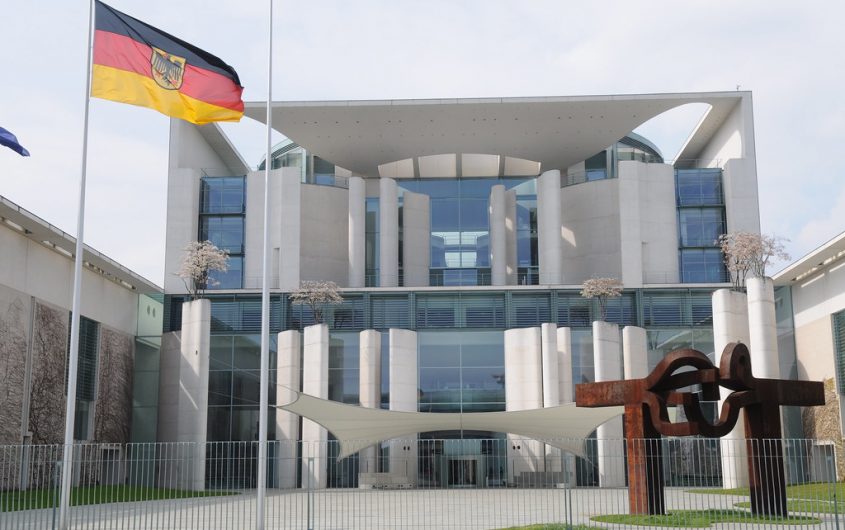
"startsocial - Preisträger" by PULS Deutschland
Choosing A Chancellor: from Bavaria to Berlin?

Jackson Janes
President Emeritus of AGI
Jackson Janes is the President Emeritus of the American-German Institute at the Johns Hopkins University in Washington, DC, where he has been affiliated since 1989.
Dr. Janes has been engaged in German-American affairs in numerous capacities over many years. He has studied and taught in German universities in Freiburg, Giessen and Tübingen. He was the Director of the German-American Institute in Tübingen (1977-1980) and then directed the European office of The German Marshall Fund of the United States in Bonn (1980-1985). Before joining AICGS, he served as Director of Program Development at the University Center for International Studies at the University of Pittsburgh (1986-1988). He was also Chair of the German Speaking Areas in Europe Program at the Foreign Service Institute in Washington, DC, from 1999-2000 and is Honorary President of the International Association for the Study of German Politics .
Dr. Janes is a member of the Council on Foreign Relations, the International Institute for Strategic Studies, the Atlantic Council of the United States, and American Purpose. He serves on the advisory boards of the Berlin office of the American Jewish Committee, and the Beirat der Zeitschrift für Außen- und Sicherheitspolitik (ZfAS). He serves on the Selection Committee for the Bundeskanzler Fellowships for the Alexander von Humboldt Foundation.
Dr. Janes has lectured throughout Europe and the United States and has published extensively on issues dealing with Germany, German-American relations, and transatlantic affairs. In addition to regular commentary given to European and American news radio, he has appeared on CBS, CNN, C-SPAN, PBS, CBC, and is a frequent commentator on German television. Dr. Janes is listed in Who’s Who in America and Who’s Who in Education.
In 2005, Dr. Janes was awarded the Officer’s Cross of the Order of Merit of the Federal Republic of Germany, Germany’s highest civilian award.
Education:
Ph.D., International Relations, Claremont Graduate School, Claremont, California
M.A., Divinity School, University of Chicago
B.A., Sociology, Colgate University
Expertise:
Transatlantic relations, German-American relations, domestic German politics, German-EU relations, transatlantic affairs.
__

Stephen F. Szabo
Senior Fellow
Dr. Stephen F. Szabo is a Senior Fellow at AICGS, where he focuses on German foreign and security policies and the new German role in Europe and beyond. Until June 1, he was the Executive Director of the Transatlantic Academy, a Washington, DC, based forum for research and dialogue between scholars, policy experts, and authors from both sides of the Atlantic. Prior to joining the German Marshall Fund in 2007, Dr. Szabo was Interim Dean and Associate Dean for Academic Affairs and taught European Studies at The Paul H. Nitze School of Advanced International Studies, Johns Hopkins University. He served as Professor of National Security Affairs at the National War College, National Defense University (1982-1990). He received his PhD in Political Science from Georgetown University and has been a fellow with the Alexander von Humboldt Stiftung, the Woodrow Wilson International Center for Scholars, and the American Academy in Berlin, as well as serving as Research Director at AICGS. In addition to SAIS, he has taught at the Hertie School of Governance, Georgetown University, George Washington University, and the University of Virginia. He has published widely on European and German politics and foreign policies, including. The Successor Generation: International Perspectives of Postwar Europeans, The Diplomacy of German Unification, Parting Ways: The Crisis in the German-American Relationship, and Germany, Russia and the Rise of Geo-Economics.
The abrupt departure of Annegret Kramp-Karrenbauer (AKK) from the race to replace Angela Merkel as chancellor leaves several potential CDU candidates vying for the opportunity. The immediate focus has been on three men who have been tagged to watch: Friedrich Merz, Jens Spahn, and Armin Laschet. Each appear viable. Merz, former CDU whip in the Bundestag, tried to win the position of chair of the CDU last year but lost to AKK by a thin margin. Jens Spahn, currently health minister in Merkel’s cabinet, represents the younger generation of the party with a conservative accent. Armin Laschet, current minister-president of Germany’s largest state, North Rhine-Westphalia, is a moderate in the party versus the more conservative Merz or Spahn. There is one additional name making the rounds as an outlier in the race: The minister-president of Schleswig-Holstein, Daniel Günther, who is currently in a coalition government with the Greens and the FDP. But there seems to be a three-way race for the chairmanship as of now.
How quickly this race can be concluded is not clear. Given the need to come up with a candidate to run in next year’s election by the end of this year, one might conclude that the chairman of the party will be that candidate. The tradition in the CDU has always been to have the two positions held by whoever is chancellor.
But that need not be the case.
While it is a long shot, there are reasons to consider one more chancellor candidate: Markus Söder, Minister-President of Bavaria. For many reasons that would be complicated, not the least of which is that Söder has indicated he is not interested in running for chancellor, the idea of the CSU leader running on the joint CDU-CSU ticket is not likely. But it has happened before and could happen again.
The last time a CSU leader campaigned for chancellor was in 2002. The then minister-president of Bavaria, Edmund Stoiber, ran against the incumbent Gerhard Schröder. Angela Merkel was at that time Chairman of the CDU and she supported Stoiber’s candidacy. It is possible that her reasoning was based on the expectation that he would lose. For both domestic and foreign policy reasons, Stoiber did lose the race, but only by 6,000 votes, the closest election in postwar German political history, suggesting that a CSU candidate could draw a national following.
More than two decades earlier, CSU leader Franz Josef Strauss challenged Helmut Schmidt in the 1980 elections. Strauss also lost. The Chairman of the CDU at that time was Helmut Kohl, who deferred to Strauss but went on to become chancellor two years later and held that job for a record-setting sixteen years.
The specific lessons of this history might be relevant today. The candidacies of both Strauss and Stoiber were supported by the CDU and the CSU for reasons that had to do with the political environment at the time. In 1980, the Federal Republic of Germany was on the front line of the Cold War. Helmut Kohl was chairman of the CDU but he had lost the national election in 1976 and Strauss criticized him severely for that misstep. Kohl was far from being a charismatic leader. By the time of the 1980 elections, Helmut Schmidt was a popular figure in the Federal Republic of Germany and many in the CDU thought he might be unbeatable. Strauss, however, was a more polarizing figure in a time of consensus centrist-oriented politics and lost to the incumbent, Helmut Schmidt. But after this loss, Helmut Kohl could claim the CSU had had its chance and regained his stature in the CDU.
In 2002, Germany was struggling with the burdens of German unification. Schröder appeared to be unsteady in dealing with the economic fallout in both eastern and western Germany. But the confrontation with the Bush administration over the impending war with Iraq and a serious environmental crisis with major flooding in the summer of 2002 opened up a chance for Schröder to regain footing. However, three years later, Angela Merkel won the first of her four elections in 2005.
Fast forward to 2020. Angela Merkel’s plan for transition has failed. AKK is no longer a candidate for chancellor and wants to resign her post as Chairman of the CDU. The party is not in good shape as measured by serious drops in the polls and also by tensions within the party. In a series of regional elections, losses in support have been seen going to the benefit of the Greens and the AfD. The restoration of the party’s position in next year’s election is at stake. But who can accomplish that?
Friedrich Merz is a huge favorite of conservatives but the party is seriously fragmented at the moment— indeed, as it was at the Hamburg party convention in 2018 when he lost to AKK. Winning back support from those who were attracted to the AfD is as important as regaining support from those who gravitate to the Greens. Many question whether Friedrich Merz can build that bridge.
With Spahn, the question is whether he is at this point ready to make that large jump as chancellor candidate. It is possible that he could successfully shoot for the chairmanship of the party, but as a candidate for that job last year he did not assemble sufficient support and ran third against AKK and Merz. That leaves Laschet as the back-up plan, but even in his case there are some that might feel he is too much of a continuation of Merkel and not the break from the current problems that they are facing.
So why then consider Marcus Söder as a chancellor candidate to run in 2021?
Today’s polarized atmosphere in Germany might open a door to Söder. In the last state election in 2018, Söder was elected minister-president. The CSU suffered losses while the right-wing AfD picked up more support than expected. Since then Söder has gained popularity in Bavaria and has taken a hard line on the AfD as well as against the Greens as major rivals. The question being raised is whether Söder could speak to a national audience. He has said that Germans may not want to be governed from the Hofbräuhaus. However, unlike the two previous cases, the country now seems be moving in Bavaria’s direction. It is now polarized around immigration, economic anxiety, concerns about the future of the European Union (particularly the euro), and sensing a loss of trust in leadership and more generally about the role Germany should be playing in Europe. Söder has been active on climate policy and could be acceptable to the Greens in a future coalition. In addition, the electorate in eastern Germany could find this Bavarian more of a kindred spirit given that state’s independence from the politics of Berlin.
Would Söder be more attractive and effective than the three other candidates, incidentally all of whom come from North Rhine-Westphalia? Clearly Merz, Laschet, and Spahn are ambitious and are ready to compete for the job. But each carry liabilities within the CDU. The accession of Merz would mean a major split with Merkel and the possibility of an early election, which few in the party want. Laschet would be a safe choice in terms of party unity but not the kind of chancellor candidate who could draw AfD voters. Spahn could be the German Sebastian Kurz but is still a bit young and not quite ready for this next step. If he were to be chosen as party chair he could pair well with Söder as a dynamic new generation of leaders.
Söder may choose not to run but whoever wins next year will be significantly challenged to pull the country together at a time when the political party system is splintering.









